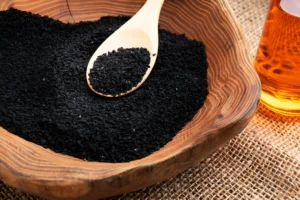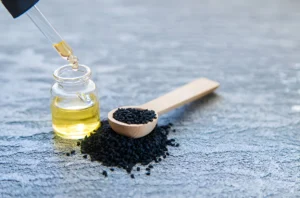
Understanding Anemia and Its Impact
Anemia serves as a systemic disruption to the transport of oxygen throughout the body, and affects just about every aspect of health. Anemia affects numerous systems throughout the body, resulting in a variety of symptoms and sequelae through its effects on red blood cell (RBC) efficiency.
- Decreased Physical Performance: Chronic weariness, muscular weakness, and low stamina are caused by impaired oxygen transport, which makes it difficult to carry out everyday tasks and maintain maximal physical capacity.
- Cognitive Impairment: Insufficient oxygenation negatively impacts brain function, leading to issues with focus, memory, and mental clarity that can impede day-to-day activities and cognitive performance.
- Cardiovascular Strain: The heart works harder to make up for lower oxygen levels, which can exacerbate heart-related disorders such as palpitations, chest discomfort, and an increased risk of heart attacks.
Benefits of Black Seed Oil for Anemia
Black seed oil has been treasured in traditional medicine for its extensive health benefits. This potent oil is rich in essential nutrients such as fatty acids, vitamins, minerals, and bioactive compounds like nigellone. These components impart black seed oil with notable antioxidant, anti-inflammatory, and immune-enhancing properties, making it a natural candidate for addressing anemia. By supporting red blood cell production, increasing hemoglobin levels, and enhancing overall blood health, black seed oil serves as a valuable addition to anemia management strategies. The use of black cumin seed for anemia further underscores its potential in improving blood health.
- Enhancing Red Blood Cell Production: The bioactive compounds in black seed oil, particularly nigellone, are believed to stimulate the production of red blood cells. This is crucial for individuals suffering from anemia, where the body’s ability to produce healthy blood cells is compromised. By promoting the regeneration of red blood cells, black seed oil helps restore optimal blood cell counts.
- Supporting Digestive Health: It is important to help the body with absorption of nutrients for managing anemia. Black seed oil boosts overall digestion which in turn encourages the absorption of iron, a crucial factor for blood health. By efficiently absorbing the nutrients, a healthy digestive system enhances what you eat and helps treat anemia effectively.
- Raising Blood Glucose Levels: Oxygen is transported throughout the body by the red blood cell protein called hemoglobin. Black seed oil helps to reduce anemia symptoms by promoting hemoglobin synthesis due to its high iron, vitamin, and important fatty acid content. Correcting inadequacies and enhancing general oxygen transport are made possible by its iron-boosting qualities. Hemoglobin deficits can be effectively addressed using the black cumin seed for anemia technique.
- Boosting Immune Function: Anemia can be exacerbated by weakened immune function. Black seed oil enhances immune system activity, providing added protection against infections and inflammation that may worsen anemia. By strengthening the immune response, black seed oil helps maintain a balanced internal environment that supports anemia recovery.
- Enhancing Energy and Vitality: Anemia often leads to fatigue and low energy levels. Black seed oil can help boost overall energy and vitality by improving blood circulation and oxygen delivery to tissues. Its nutrient-rich profile supports general well-being, which can help alleviate the fatigue commonly associated with anemia. Its revitalizing properties contribute to a more active and energetic lifestyle.

Black Seed Oil and Specific Types of Anemia
Anemia encompasses a variety of conditions characterized by reduced red blood cell count or hemoglobin levels, each with distinct causes and treatment needs. Black seed oil, with its broad spectrum of beneficial properties, can be tailored to support the management of specific types of anemia. Here’s how it addresses different forms of anemia:
Black Cumin Seed Oil Treating Aplastic Anemia
Aplastic anemia is a serious illness characterized by insufficient production of red blood cells by the bone marrow. Treatments for this kind of anemia usually entail medication, blood transfusions, or bone marrow transplants, and they are frequently difficult to manage. On the other hand, reports indicating black cumin seed oil cures aplastic anemia imply that it may provide supporting effects by boosting the generation of red blood cells and activating bone marrow. Due to immune-modulating properties of black seed oil, the immune system’s attack on bone marrow, a major cause of aplastic anemia, may be lessened. The nutrients in the oil give the bone marrow a healthy environment, which may promote blood cell synthesis and renewal.
Black Seed Oil and Iron-Deficiency Anemia
Black seed oil has demonstrated potential advantages in the treatment of iron-deficiency anemia, a disorder when the body cannot produce enough hemoglobin due to an iron deficiency. Research on black seed oil anemia indicates that its high iron concentration and bioactive components may aid in iron reserves being replenished, which would improve hemoglobin levels and reduce symptoms. Black seed oil works by improving the body’s iron reserves and facilitating iron absorption in the intestines, which helps the creation of red blood cells and the transportation of oxygen. Black seed oil for anemia can be a useful natural supplement for those with iron-deficiency anemia since it helps improve iron absorption and utilization when added to a balanced diet as well as food rich in vitamin C.
Black Seed Oil and Vitamin-Deficiency Anemia
Anemia is caused by a deficit in certain vitamins, such as folate or vitamin B12, which the body needs to produce red blood cells. Black cumin seed oil and vitamin C for anemia can help the body meet its requirements by enhancing the body’s ability to absorb these vitamins and supplying vital minerals. The body’s capacity to produce healthy red blood cells is enhanced by the vitamins and antioxidants included in black seed oil. Black seed oil may be optimally absorbed when combined with other nutrient-dense foods, which increases its advantages and makes it a valuable component of dietary plans intended to address vitamin-deficiency anemia.
Black Seed Oil Sickle Cell Anemia
The hereditary condition known as sickle cell anemia results in the development of abnormal red blood cells with a sickle shape. This condition can lead to infections, severe discomfort, and other consequences. Preliminary studies indicate that sickle cell anemia black seed oil treatment might help due to its anti-inflammatory properties and ability to improve blood flow. Patients with sickle cell anemia may have fewer pain crises as a result of black sesame oil’s anti-inflammatory properties. Black seed oil can help circulation, which is frequently hampered by sickle cell anemia, by increasing blood cell elasticity and decreasing blood clot formation.
The Historic Role of Black Seed Oil in Blood Wellness
Black seed oil has a long history of use in treating blood disorders, spanning across ancient civilizations and traditional medicine systems such as Ayurveda, Unani, and traditional Middle Eastern practices. For thousands of years, it was highly regarded for its ability to address symptoms associated with anemia and blood deficiencies, including fatigue, pale skin, and weakness. Ancient texts, like those of Avicenna, praised black seed for its restorative properties, often referring to it as a “cure for everything but death.” Black cumin seed oil and anemia were frequently linked in these historical contexts, highlighting its perceived value in enhancing blood health and overall vitality. In various cultures, black seed transcended its role as a mere remedy, becoming an integral part of daily life. It was infused into culinary traditions, ceremonial practices, and potent medicinal elixirs, celebrated for its ability to invigorate the body and extend vitality, symbolizing a bridge between health and spiritual well-being. Its historical significance reflects its role in addressing a wide array of health concerns. The oil’s application in managing inflammatory conditions and infections illustrates its versatile benefits, reinforcing its importance in holistic health practices.

Scientific Validation of Black Seed Oil for Anemia
The potential advantages of black seed oil in the treatment of anemia are still being discovered by scientific study. Black seed oil has the ability to promote blood health; a research that was published in the “Journal of Clinical Medicine” reported that supplementing with it considerably increased hemoglobin levels and red blood cell counts in animal models of anemia. An inquiry published in the “Journal of Medicinal Food,” scientists found that anemic individuals’ blood ferritin levels and iron absorption were elevated by black seed oil, both of which are critical indicators of iron deficient anemia. A clinical trial carried out at the University of Cairo revealed that red blood cell stability and oxidative stress were both decreased in sickle cell anemia patients supplementing with black seed oil, suggesting that black seed oil may help manage the complications associated with more severe forms of anemia. According to these results, black seed oil may be a useful natural supplement in the treatment of anemia. Research is still being done to determine the best ways to use it and its wider range of uses.
Using Black Seed Oil in conjunction with Natural Treatments to Provide Efficient Anemia Support
To optimize the management of anemia, integrating black seed oil with complementary natural remedies can offer enhanced benefits. Black seed oil, known for its potent therapeutic properties, can work synergistically with other nutrient-rich supplements to provide a more comprehensive approach to anemia treatment.
| Complementary Remedy | Description | Synergistic Effect with Black Seed Oil |
| Moringa | Renowned as the “miracle tree” for its high iron content and essential nutrients. | Significantly boosts iron levels and overall nutrient intake, enhancing anemia management. |
| Spirulina | Nutrient-dense blue-green algae rich in iron and vital nutrients. | Enhances red blood cell production and fortifies the effects of black seed oil for improved blood health. |
| Beetroot Juice | High in folate, crucial for red blood cell production. | Complements black seed oil’s iron-boosting effects, enhancing red blood cell production and anemia combat. |
Incorporating these complementary remedies into your routine alongside black seed oil provides a holistic approach to managing anemia, addressing multiple aspects of blood health and improving overall efficacy.
Practical Use and Future Insights for Black Seed Oil in Anemia Treatment
Including black seed oil in your regimen for managing anemia can have a number of advantages. Start with tiny quantities, like half a teaspoon a day, and work your way up to one teaspoon while paying close attention to how your body reacts. To enhance iron absorption, try combining black seed oil with meals high in vitamin C, such as oranges, strawberries, or bell peppers. It may take many weeks before anemia symptoms show any discernible improvement, therefore constant and regular usage is essential. Black seed oil is generally harmless, however it can interact with some drugs and have adverse effects, such as gastrointestinal distress or allergic responses. It is imperative that you speak with a healthcare professional before beginning, particularly if you are on other drugs or have underlying medical issues.
Recent studies demonstrate the potential of black cumin seed oil as an all-natural anemia treatment. Subsequent research ought to concentrate on ascertaining its efficacy for other forms of anemia, evaluating the enduring advantages and security of prolonged utilization, and investigating potential ways in which it may supplement traditional therapies. Developing evidence-based guidelines and realizing the full potential of black cumin seed oil in the therapy of anemia would require this kind of study.
Key Takeaways
Black seed oil presents a compelling natural option for managing diverse types of anemia due to its rich nutritional content and therapeutic properties. Red blood cell development and hemoglobin synthesis are supported by its high content of vital fatty acids, vitamins, and antioxidants. The oil may help treat anemia because of its anti-inflammatory and immune-stimulating properties. Black seed oil can help people feel better and have fewer symptoms when it is included in a well-rounded therapy program. It is imperative that you speak with a healthcare provider before changing your regimen to ensure black seed oil is a good fit for your entire treatment plan and to steer clear of any potential conflicts or side effects.









